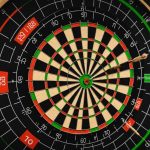Unlocking Mental Mastery: Top Strategies for Footballers to Boost Cognitive Skills on the Field
The Importance of Mental Performance in Soccer
When it comes to soccer, the mental aspect of the game is just as crucial as the physical. Top soccer players understand that mental toughness and cognitive skills are key to achieving peak performance on the field. Sports psychology has become an integral part of training programs for athletes, helping them to improve their mental resilience, confidence, and overall game.
“Mental preparation is crucial in soccer. It’s what separates the good players from the great ones,” says Dr. Jason Dukes, a sports psychologist who has worked with several professional soccer teams. “Players who can manage their mental game are better equipped to handle pressure, stay focused, and make decisive decisions during critical moments of the game.”
Also read : Maximizing Performance: Innovative Strategies for Football Teams to Enhance Pre-Match Warm-Up Routines
Building Mental Strength Through Training Techniques
Goal Setting
One of the most effective strategies for improving mental performance is goal setting. Athletes who set clear, achievable goals are more likely to stay motivated and focused. Here’s how soccer players can implement goal setting:
- Short-term and Long-term Goals: Set both short-term and long-term goals. For example, a short-term goal might be to improve passing accuracy in the next few training sessions, while a long-term goal could be to become a starter in the team.
- Specific and Measurable: Make sure goals are specific and measurable. Instead of saying “I want to be better,” say “I want to increase my shot accuracy by 20% in the next month.”
- Write It Down: Writing down your goals makes them more tangible and helps in tracking progress.
Mental Rehearsal
Mental rehearsal, or mental imagery, is another powerful tool. This technique involves visualizing yourself performing well on the field.
Topic to read : Top Post-Match Recovery Strategies for Football Players Aged 30 and Above
- Detailed Visualization: Close your eyes and vividly imagine yourself making perfect passes, scoring goals, and defending successfully. Use all your senses to make the visualization as real as possible.
- Positive Self-Talk: Combine visualization with positive self-talk. Encourage yourself with affirmations like “I am confident,” “I am prepared,” and “I can do this.”
Enhancing Focus and Concentration
Pre-Game Preparation
Pre-game preparation is critical for maintaining focus and concentration during the game. Here are some strategies soccer players can use:
- Routine: Establish a pre-game routine that helps you get into the right mindset. This could include activities like reading, listening to music, or doing light stretching.
- Visualization: Use mental rehearsal just before the game to visualize yourself performing well.
- Breathing Exercises: Practice deep breathing exercises to calm your nerves and stay focused.
Staying Present
Staying present in the game is essential for maintaining focus. Here’s how athletes can achieve this:
- Mindfulness: Practice mindfulness techniques during training sessions. Focus on the present moment and the task at hand.
- Break the Game Down: Instead of worrying about the entire game, break it down into smaller segments. Focus on one play at a time.
Developing Cognitive Skills Through Practice
Skills Training
Skills training is not just about physical practice; it also involves mental preparation. Here’s how soccer players can integrate mental skills into their training:
- Decision-Making Drills: Incorporate drills that require quick decision-making. For example, a player might have to decide whether to pass or shoot based on the movement of teammates and opponents.
- Pressure Situations: Practice under pressure. This could involve playing small-sided games or scenarios where the player has to perform under tight deadlines.
Mental Resilience
Mental resilience is the ability to bounce back from setbacks. Here are some ways soccer players can build mental resilience:
- Learn from Mistakes: Instead of getting discouraged by mistakes, use them as learning opportunities. Analyze what went wrong and how you can improve next time.
- Positive Feedback: Focus on positive feedback rather than negative criticism. Encourage yourself and your teammates with positive affirmations.
Table: Comparing Mental Training Techniques
| Technique | Description | Benefits | Examples |
|---|---|---|---|
| Goal Setting | Setting specific, measurable goals | Increases motivation and focus | Short-term and long-term goals, writing down goals |
| Mental Rehearsal | Visualizing performance | Enhances confidence and preparation | Detailed visualization, positive self-talk |
| Pre-Game Preparation | Establishing a routine before the game | Helps in staying focused and calm | Routine activities, visualization, breathing exercises |
| Mindfulness | Focusing on the present moment | Improves concentration and decision-making | Breaking the game down into smaller segments, focusing on one play at a time |
| Skills Training | Integrating mental skills into physical practice | Develops cognitive skills and decision-making | Decision-making drills, practicing under pressure |
| Mental Resilience | Building the ability to bounce back from setbacks | Enhances overall mental performance | Learning from mistakes, positive feedback |
Practical Insights and Actionable Advice
Creating a Mental Training Plan
To integrate these strategies into your training, it’s important to create a mental training plan. Here are some steps to follow:
- Assess Your Current Mental State: Evaluate your current mental strengths and weaknesses.
- Set Mental Goals: Set specific mental goals, such as improving focus or building confidence.
- Choose Techniques: Select the techniques that best fit your needs and goals.
- Practice Consistently: Incorporate mental training into your daily routine, just like physical training.
Seeking Help
Sometimes, seeking help from professionals can be incredibly beneficial. Here’s why:
- Sports Psychologists: Working with sports psychologists can provide personalized strategies and feedback.
- Team Support: Having a supportive team environment can also help in building mental strength.
“Seeking help is a sign of strength, not weakness,” says Dr. Dukes. “Athletes who are willing to work on their mental game are more likely to achieve success.”
Real-Life Examples and Anecdotes
The Case of Cristiano Ronaldo
Cristiano Ronaldo is a prime example of an athlete who has mastered the mental game. Known for his rigorous training regimen, Ronaldo also places a strong emphasis on mental preparation.
“I always visualize myself scoring goals and winning games,” Ronaldo has said in interviews. “It gives me the confidence to perform at my best.”
The Story of Jordan Henderson
Jordan Henderson, the captain of Liverpool FC, has spoken about the importance of mental resilience in his career. After facing several setbacks, including injuries and criticism, Henderson has learned to bounce back stronger each time.
“Mental toughness is about how you respond to adversity,” Henderson said. “It’s about staying positive and focused even when things aren’t going your way.”
Unlocking mental mastery is a journey that requires dedication, practice, and the right strategies. By incorporating techniques such as goal setting, mental rehearsal, and skills training into their routine, soccer players can significantly improve their cognitive skills and overall performance on the field.
Remember, mental training is just as important as physical training. It’s about building the mental strength and resilience needed to achieve peak performance and success in the game.
As Dr. Dukes puts it, “The mental game is what sets the champions apart. It’s the key to unlocking your full potential as an athlete.”











